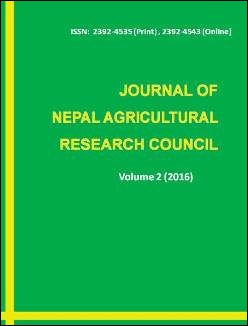Biovar Differentiation and Variation in Virulence of Ralstonia solanacearum Isolates Infecting Solanaceous Vegetables
DOI:
https://doi.org/10.3126/jnarc.v2i0.16117Keywords:
Bacterial wilt, Biovar, Ralstonia solanacearum, Strain, VirulenceAbstract
Bacterial wilt caused by Ralstonia solanacearum E.F. Smith is one of the destructive diseases of solanaceous vegetables specially tomato (Lycopersicon esculentum L.) and eggplant (Solanum melongena L.). Experiments were conducted to determine biovar types existing among the strains or isolates of Nepal and variation in virulence in some vegetables belonging to solanaceae family. A total of 39 isolates infecting tomato, eggplant, chilli and potato collected from different parts of Nepal were analyzed for biovar types on the basis of 3 disaccharides and 3 hexose alcohols oxidation test. Experiments were conducted to determine variation in virulence or aggressiveness of some of the isolates under screen house conditions using three host differentials such as Pusa Ruby (susceptible), Bishesh (moderately resistant) and Srijana (resistant) tomato cultivars. Of the 39 isolates, 23 were biovar III, three biovar II, three biovar IV, and one was biovar I. Nine isolates could not be differentiated into any of the five biovars. For breeding and epidemiological purposes it is very important to analyze the variability of aggressiveness. A total of 5 isolates collected from different places were included in the test. Isolates from Bhaktapur was found the most virulent causing wilt in the variety Bishesh (moderately resistant). Other isolates had the negative impact with zero wilt on the differentials used. Isolates from Jungekhola of Dhading district did not induce wilt even on susceptible variety (Pusa Ruby), but exhibited only senescence reaction. The result indicated that there is some slight variation among the isolates tested. Some effective management tactics might be needed in those locations where highly aggressive or virulent strain of bacterial wilt is prevalent, because resistant variety may not be stable in such locations.Downloads
Download data is not yet available.
Abstract
996
PDF
1562
Downloads
Published
2016-12-30
How to Cite
Timila, R. D., & Manandhar, S. (2016). Biovar Differentiation and Variation in Virulence of Ralstonia solanacearum Isolates Infecting Solanaceous Vegetables. Journal of Nepal Agricultural Research Council, 2, 22–26. https://doi.org/10.3126/jnarc.v2i0.16117
Issue
Section
Articles
License
This license enables reusers to distribute, remix, adapt, and build upon the material in any medium or format for noncommercial purposes only, and only so long as attribution is given to the creator.




